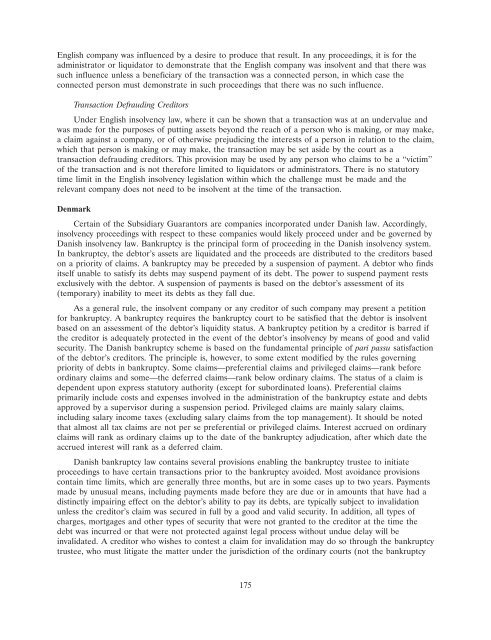Ardagh Glass Finance plc - Irish Stock Exchange
Ardagh Glass Finance plc - Irish Stock Exchange
Ardagh Glass Finance plc - Irish Stock Exchange
You also want an ePaper? Increase the reach of your titles
YUMPU automatically turns print PDFs into web optimized ePapers that Google loves.
English company was influenced by a desire to produce that result. In any proceedings, it is for the<br />
administrator or liquidator to demonstrate that the English company was insolvent and that there was<br />
such influence unless a beneficiary of the transaction was a connected person, in which case the<br />
connected person must demonstrate in such proceedings that there was no such influence.<br />
Transaction Defrauding Creditors<br />
Under English insolvency law, where it can be shown that a transaction was at an undervalue and<br />
was made for the purposes of putting assets beyond the reach of a person who is making, or may make,<br />
a claim against a company, or of otherwise prejudicing the interests of a person in relation to the claim,<br />
which that person is making or may make, the transaction may be set aside by the court as a<br />
transaction defrauding creditors. This provision may be used by any person who claims to be a ‘‘victim’’<br />
of the transaction and is not therefore limited to liquidators or administrators. There is no statutory<br />
time limit in the English insolvency legislation within which the challenge must be made and the<br />
relevant company does not need to be insolvent at the time of the transaction.<br />
Denmark<br />
Certain of the Subsidiary Guarantors are companies incorporated under Danish law. Accordingly,<br />
insolvency proceedings with respect to these companies would likely proceed under and be governed by<br />
Danish insolvency law. Bankruptcy is the principal form of proceeding in the Danish insolvency system.<br />
In bankruptcy, the debtor’s assets are liquidated and the proceeds are distributed to the creditors based<br />
on a priority of claims. A bankruptcy may be preceded by a suspension of payment. A debtor who finds<br />
itself unable to satisfy its debts may suspend payment of its debt. The power to suspend payment rests<br />
exclusively with the debtor. A suspension of payments is based on the debtor’s assessment of its<br />
(temporary) inability to meet its debts as they fall due.<br />
As a general rule, the insolvent company or any creditor of such company may present a petition<br />
for bankruptcy. A bankruptcy requires the bankruptcy court to be satisfied that the debtor is insolvent<br />
based on an assessment of the debtor’s liquidity status. A bankruptcy petition by a creditor is barred if<br />
the creditor is adequately protected in the event of the debtor’s insolvency by means of good and valid<br />
security. The Danish bankruptcy scheme is based on the fundamental principle of pari passu satisfaction<br />
of the debtor’s creditors. The principle is, however, to some extent modified by the rules governing<br />
priority of debts in bankruptcy. Some claims—preferential claims and privileged claims—rank before<br />
ordinary claims and some—the deferred claims—rank below ordinary claims. The status of a claim is<br />
dependent upon express statutory authority (except for subordinated loans). Preferential claims<br />
primarily include costs and expenses involved in the administration of the bankruptcy estate and debts<br />
approved by a supervisor during a suspension period. Privileged claims are mainly salary claims,<br />
including salary income taxes (excluding salary claims from the top management). It should be noted<br />
that almost all tax claims are not per se preferential or privileged claims. Interest accrued on ordinary<br />
claims will rank as ordinary claims up to the date of the bankruptcy adjudication, after which date the<br />
accrued interest will rank as a deferred claim.<br />
Danish bankruptcy law contains several provisions enabling the bankruptcy trustee to initiate<br />
proceedings to have certain transactions prior to the bankruptcy avoided. Most avoidance provisions<br />
contain time limits, which are generally three months, but are in some cases up to two years. Payments<br />
made by unusual means, including payments made before they are due or in amounts that have had a<br />
distinctly impairing effect on the debtor’s ability to pay its debts, are typically subject to invalidation<br />
unless the creditor’s claim was secured in full by a good and valid security. In addition, all types of<br />
charges, mortgages and other types of security that were not granted to the creditor at the time the<br />
debt was incurred or that were not protected against legal process without undue delay will be<br />
invalidated. A creditor who wishes to contest a claim for invalidation may do so through the bankruptcy<br />
trustee, who must litigate the matter under the jurisdiction of the ordinary courts (not the bankruptcy<br />
175
















